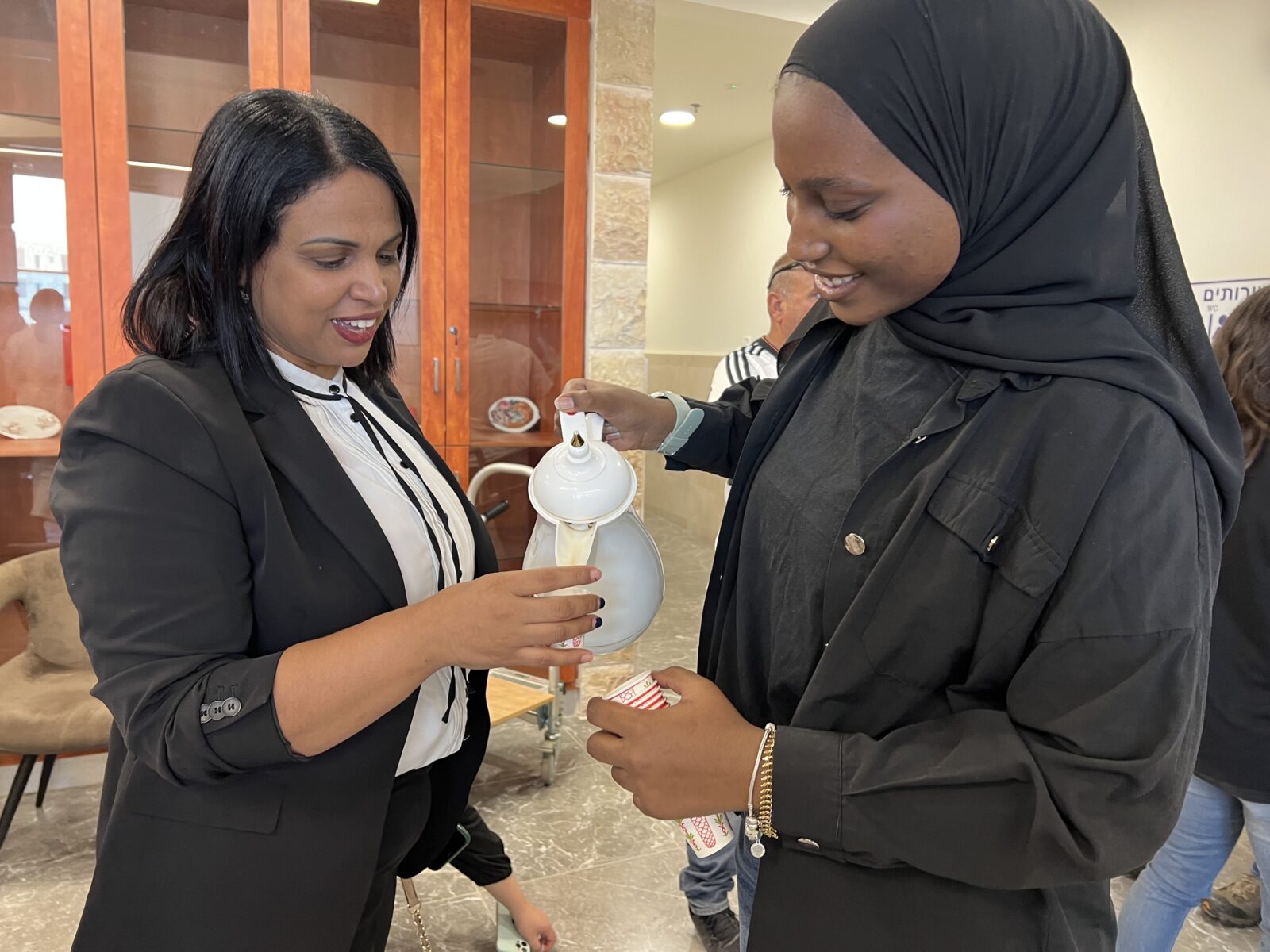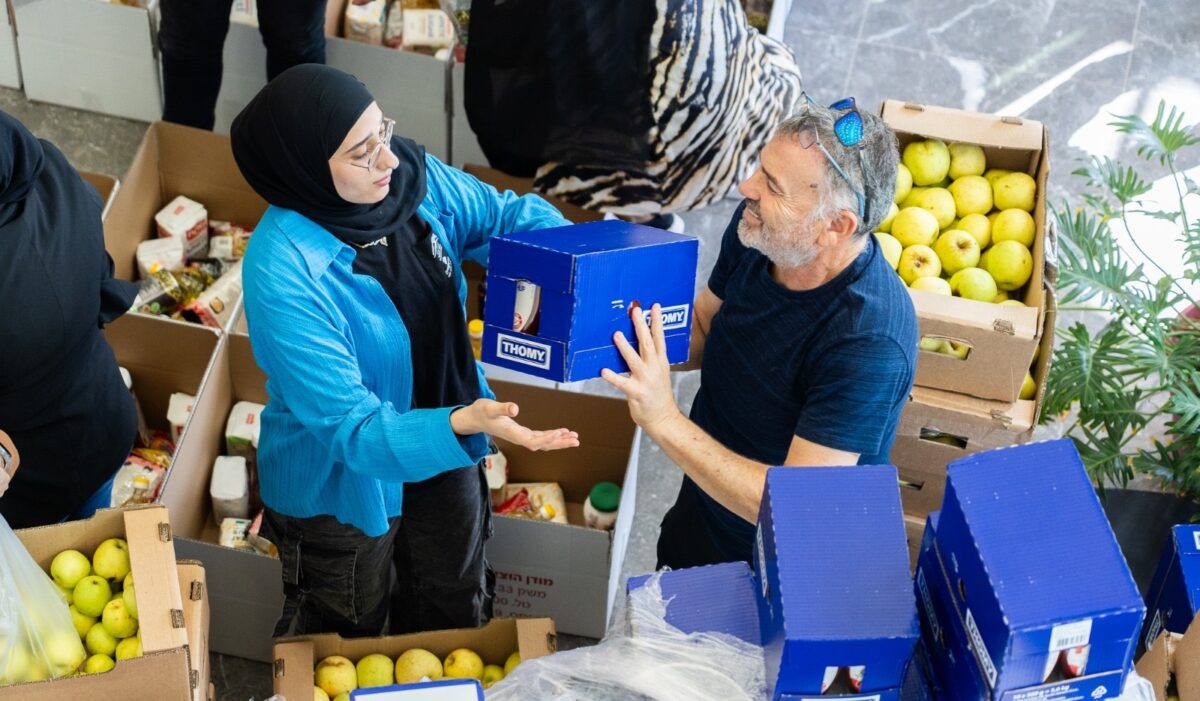
Jews, Bedouins unite in face of Hamas terror attacks on Israel
Hundreds of Bedouin and Jewish volunteers in Rahat prepare aid parcels in a collaborative atmosphere, despite the war taking place just miles away
RAHAT, Israel – The community center on the outskirts of this southern city looks like many others in Israel during these days of war: Hundreds of volunteers work double time to fill neat rows of white cardboard boxes with all manner of basic staples and fruit for distribution to thousands of families hardest hit by Hamas’ mass terror attack on Oct. 7.
Yet, Rahat, which sits less than 20 miles from the Gaza Strip, offers a slightly different perspective on a story that has already claimed thousands of victims and dragged Israel into a five-week war that shows no signs of slowing down.
With some 80,000 residents, Rahat is one of the largest Bedouin Arab cities in the entire Middle East and a central hub for hundreds of smaller, undocumented Bedouin villages and tribal communities that dot Israel’s Negev region.
Its deeply religious and conservative population has also felt the impact of the war — as well as the horrors of Hamas’ brutal attack.
“It is not easy for us to talk about,” Daham Ziyadna, from the Ziyadna tribe near Rahat, told Jewish Insider. “We are talking about people who were murdered, we are talking about people who were kidnapped by Hamas.”
“Hamas came into Israel and attacked everyone, including people who were clearly Muslims, women wearing hijabs and speaking Arabic,” continued Ziyadna, whose cousin, Yousef, 53, and his three children, Hamza, 23, Bilal, 18, and Aisha, 17, were taken hostage by the Palestinian terrorists from their workplaces on Kibbutz Holit.
According to Ziyadna, the Hamas terrorists either did not believe the Bedouins they encountered during their murderous rampage were Muslims or they did not care.
“They [Hamas] called us Jews and murdered us,” he said, highlighting that more than 20 Bedouins were shot and killed by Hamas terrorists, and that the community continues to face hardship. Many have lost their jobs in the chaos that followed Oct. 7 and there is a widespread lack of infrastructure, such as bomb shelters offering protection from Hamas rockets.

In total, nine Bedouins are still missing since Oct. 7, with at least six believed to be held hostage by Hamas or other terror groups in Gaza. For the past eight years, Hamas has also held captive another Bedouin Israeli citizen, Hisham al-Sayed, who is believed to have entered Gaza by choice. A video of him hooked up to an oxygen machine was released by the group in 2022.
“We have suffered, and we continue to suffer,” said Ziyadna, highlighting that the Bedouin community in southern Israel, where many of the roughly 200,000 Bedouins have direct or indirect family ties and connection to people in Gaza, often face discrimination inside Israel too, despite being full-fledged citizens, with some even volunteering to serve in the Israeli military.
“Our sons serve in the army, and some are inside Gaza fighting right now,” he emphasized, adding, “Many families here have spilled their blood for Israel, and it is time we are viewed as equal citizens.”
On Monday, Israeli Prime Minister Benjamin Netanyahu visited the IDF’s Bedouin Desert Patrol Battalion commending the soldiers for standing shoulder-to-shoulder with their Jewish brothers.
“They have fought, and are now fighting, heroically,” Netanyahu told the commanders of the Bedouin unit. “They are safeguarding our country in an exemplary manner and in full partnership.”
In the community center in Rahat, which is now being used as an operations center to help families such as the Ziyadnas, as well as Jewish residents of nearby towns who have been impacted by the war, the goal of promoting coexistence and highlighting the Bedouin plight are clear.

The hundreds of volunteers preparing the food parcels are a mix of Bedouins and Jews and the atmosphere, despite the heaviness of war just a few miles away, is collaborative, even jovial.
Racheli Geffen, digital director and press officer of Have You Seen the Horizon Lately, one of several NGOs overseeing the war effort in Rahat, told JI that the city’s operations center was established days after the Oct. 7 attack to push back against far right-wing activists that might use it as an excuse to further divide Israeli society or blame Israeli Arabs for what happened.
“We thought the best way to fight the darkness was to turn on the light of solidarity and coexistence,” said Geffen, adding, “There is no war between Jews and Arabs in Israel, this is a war between extremists and moderates.”
The food packages and other resources being prepared here were delivered by both Jewish and Arab truck drivers to more than 2,000 Jewish and Arab families struggling since the war started. The organizations running the operation include Jewish and Bedouin NGOs, said Geffen, including Desert Stars, a young Bedouin leadership program; Alnashmiat, a leadership group for Bedouin women; and Itach Maaki, an association of female lawyers for social justice.
Hanan Alsanah, a lawyer working with Itach Maaki, said the operations center in Rahat was started by Bedouins almost immediately after the Oct. 7 massacre and Jews from further afield joined them a few days later.
Alsanah, a mother of four who lives in nearby Beersheva, said that in the first few hours of the Hamas’ attack, the Bedouins – like many other Israelis – did not fully comprehend what was happening, but as soon as they did, they jumped into action. Doctors and nurses from the community rushed to area hospitals and some brave souls even headed out to the Israel-Gaza communities and the Nova music festival, just a few miles away, to save lives.

Tales of heroism have since emerged, of individuals who headed straight into the line of fire to rescue friends and strangers, even as terrorists rampaged near Rahat and other Bedouin towns.
Despite the outpouring of help, Alsanah said there is a concern that the attack – and now the war – will damage an already delicate relationship that exists here between Jews and Arabs.
“Only with partnership initiatives like this, can we rebuild and maintain that trust,” she said, adding that “Hamas does not represent everyone in Gaza” and all Israelis need to push back against these extreme voices.
Among those volunteering at the center last week were two 19-year-old students from Rahat — Azhar and Manar — both of whom said they felt it was important to volunteer because what is happening right now “is not just against the Jews.”
“This situation is hard for all of us, and we need to work hand in hand to get through this,” said Azhar. “We need to work together if we want to move forward as a society.”
Michal Geta, 44, a Jewish volunteer from the nearby community of Meitar, also said it was “important for our future for all citizens to join forces at this time.”
“I believe that most people in Israel are in favor of coexistence between all citizens here – we all live here together and no one is going anywhere,” she said.


